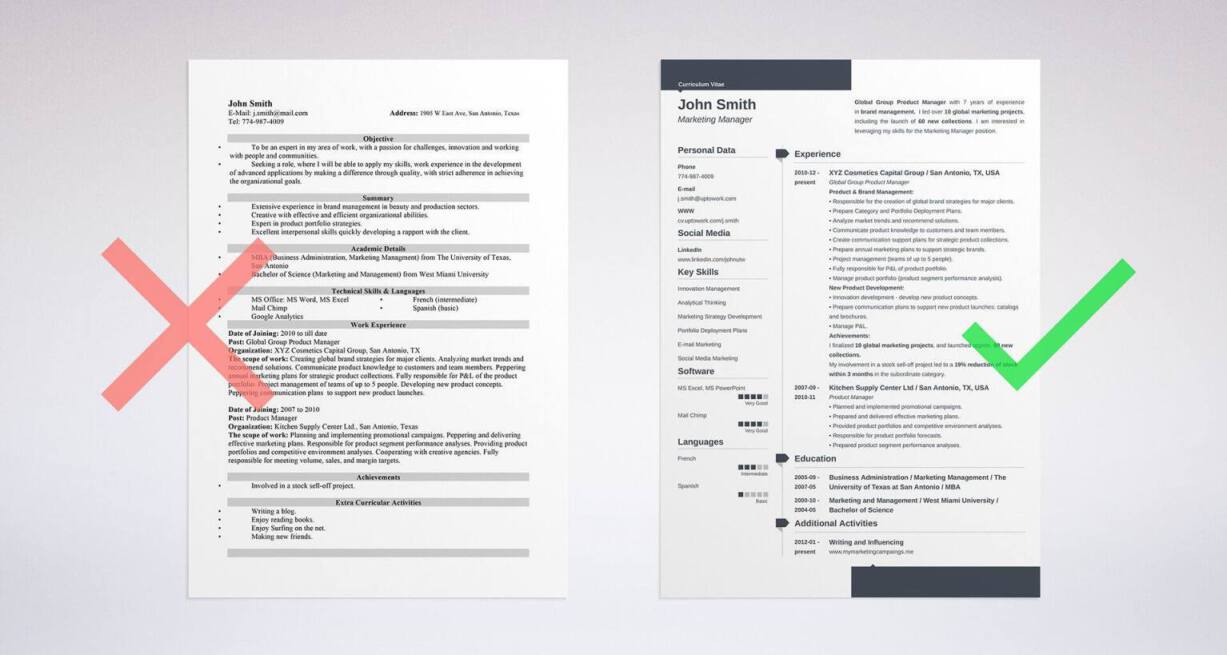
Do I Need a Cover Letter? Are Cover Letters Necessary in 2023
Do I need a cover letter? Is it important? What if the job offer doesn’t require a cover letter? Read this guide to find out all you need to know.

For most people, putting education on a resume is as easy as Tic Tac Toe. Name of University, Degree, Graduation Year - Done. But for others, figuring out how to put your education on a resume is harder than it looks.
For example, what should go first in a resume, education or experience? And how do you list education on a resume if you’re still in college?
This article will tell you how to put your education on a resume in every case:
Want to save time and have your resume ready in 5 minutes? Try our resume builder. It’s fast and easy to use. Plus, you’ll get ready-made content to add with one click. See 20+ resume templates and create your resume here.
Sample resume made with our builder—See more resume examples here.
1
Let's start with the basics.
For the most part, the education section of your resume is the easiest to write.
Pro Tip: Putting a GPA on a resume is optional. You should only add it if you graduated within the last three years and if it was above a 3.0. Otherwise, lose it. Most hiring managers won’t care what your GPA was.
Education
2009 MA in English Literature
Harvard University, Cambridge, MA
3.7 GPA
2007 BA in English Literature
University of Pennsylvania, Philadelphia, PA
4.0 GPA
Pretty simple, right?
For example, the candidate above graduate from Harvard.
As a literature major, she may feel like her degree isn’t directly related to the job for which she’s applying. That can happen when you’re an English major.
Harvard University, Cambridge, MA
MA in English Literature
Graduated in 2009 with a 3.7 GPA
Just make sure that the way you format the entries in your education section remains consistent.
For most of you, putting your education on your resume is that straightforward. If you want to add extra information, you can.
The above information is useful for anyone who has some professional experience.
If you’re a recent graduate or haven’t finished a degree, read on - we’ve got you covered. Read on...
Our resume builder lets you choose from modern or basic resume templates. Check all resume templates here.

See more professional resume templates here.
2
You can put your education above your work history if you're a student or recent graduate and have little experience. If you have more than a year of work experience, your education should come after your employment history. Your most recent degree goes first. If you have a GPA of 3.5 or more, mention it. Don't foget about relevant course work, honors, and making dean's list.
In most cases, resumes open with the experience section as it's more relevant and important to recruiters. But there's nothing wrong with breaking this rule if your education is much more impressive than your experience.
If you are a seasoned professional, put your professional work history section before your education.
Hiring managers will find your work experience much more relevant at this point in your career.
Pro Tip: If you want to save time and find out how to write a great resume for your profession, take a look at our guides and examples of resumes here.
3
We have a whole guide on this here: Should You Put High School Education on a Resume (Diploma or Not?)
Cherryville High School, Cherryville, OH
Graduated in 2005
That’s all you have to do. No, I’m not joking.
When considering what else you should include on a student resume, stick to things that show off your skills and achievements.
That can range from honors, awards, and extracurricular activities, to any work you had during high school.
You’ll want to tailor your resume to the job description. So, pick activities that will illustrate the keyword skills listed there.
You might also want to include a coursework description, adding classes that are relevant to the work you will do in your new job.
But what if you didn’t graduate high school?
Cherryville High School, Cherryville, OH
Attended school from 2003 - 2005
Just write the name of your school and the years you attended.
Cherryville High School, Cherryville, OH
Expected to graduate in 2009
GED High School Equivalency Diploma
Cherryville Adult Learning Center, Ohio, 2009
Cherryville High School, Cherryville, OH
Attended school from 2003-2005
Let’s say you graduated high school and then received a license or certificate you want to put on your resume as it’s directly related to the job for which you are applying.
Cosmetology License - 2009
Cherryville Beauty Academy, Cherryville, OH
Cherryville High School, Cherryville, OH
Graduated in 2005
4
Let’s say you went to college and then realized $30,000 worth of student debt per year wasn’t for you.
That doesn’t mean you can’t use what you did finish.
You can still put unfinished college education on your resume. All you have to do is write in the credits you did manage to get.
List your high school education after like this:
Ohio State University, Columbus, OH
2005 -2007 Completed 60 credits toward BA in Psychology
Cherryville High School, Cherryville, OH
Graduated in 2005
If you paid for it, it’s yours. If the coursework is relevant, you can put it on your resume.
Which brings us to higher education that is still in progress. In the middle of obtaining a degree?
Easy.
BA in English Literature in Progress
Sarah Lawrence College, Bronxville, NY
For more, see: How to List Expected Graduation Date on a Resume
When making a resume in our builder, drag & drop bullet points, skills, and auto-fill the boring stuff. Spell check? Check. Start building a professional resume template here for free.
When you’re done, Zety’s resume builder will score your resume and tell you exactly how to make it better.
5
As mentioned above, you’ll put your highest degree first if you’ve graduated from university.
But what else would you want to include in an education section?
Let’s say you’ve got little to no work experience.
It’s not a bad idea to include some extra points in that case.
As mentioned above, you’ll put your highest degree first if you’ve graduated from university.
But what else would you want to include in an education section?
Let’s say you’ve got little to no work experience.
It’s not a bad idea to include some extra points in that case.
If you’ve graduated from an honors program, graduated with the highest honors (magna cum laude or summa cum laude), or were the valedictorian or salutatorian of your class, put Latin honors on your resume next to your degree in your education section.
Example:
Honors BS in Biology, Valedictorian, Magna Cum Laude
Purdue University, West Lafayette, IN
Graduated in 2012
Note, you can make a separate Honors and Awards section if you feel that you have too many awards to list or want to draw special attention to them.
The same goes for academic publications for Ph.D. students.
You can either list your publications under your degree or add a separate section if there are several you’d like to mention on your non-academic resume.
Do keep in mind that the length of a student resume should be short and not exceed one page.
If you’re struggling to fill up space, adding sections (e.g., Hobbies and Interests) can be great. But don’t add so much extra information to your resume that you’re resume spills over onto a second page.
Another nice thing to add to a student resume is a coursework description. Make sure that you choose courses that are relevant to the job for which you are applying.
If you have little to no work experience, a coursework description can show that you have the knowledge and skills required for the job through your education.
Also, if you have a degree in a different field, you can show that you took courses relevant to your professional field as well. For example, you’re applying for a job in marketing, but have a degree in psychology.
Did you take any business or communication classes? Those would be good to put in your coursework description.
Bachelor of Arts in Psychology
The University of California, Berkeley, CA
Relevant Coursework: Business Communication, Social Psychology, English Language Studies, Grammar and Editing
If you feel like going into more detail here, that’s also okay. You could explain an overarching course of study that gave you a particular skill set that you want employers to notice.
You can also list extracurricular roles if you’ve graduated within the last three years and need to flesh out your resume.
Just avoid adding anything controversial (political or religious).
If you participated in any activity that would highlight these skills (or took part in a study abroad program) you can add it to your education section.
Bachelor of Arts in Psychology
The University of California, Berkeley, CA
Relevant Coursework: Business Communication, Social Psychology, English Language Studies, Grammar and Editing
Extracurricular Activities: Captain of the Lacrosse Team
Bonus: Download FREE ultimate checklist of 54 things you need to do before you send your resume. “Resume 101 Checklist.”
Want to include a different kind of education on your resume? This guide will help you out: How to List Continuing Education on a Resume
Plus, a great cover letter that matches your resume will give you an advantage over other candidates. You can write it in our cover letter builder here. Here's what it may look like:
See more cover letter templates and start writing.
The thing to remember is that there are no hard and fast rules about how to add education to your resume:
In the end, you should think of your education section as an opportunity to position yourself just ahead of the rest.
Do you have any other questions about how to put your educational background on a resume? Let me know in the comments.
If you have a couple of years of relevant work experience, just list your highest level of schooling, including the field of study, the name of the school or college, and the graduation year. However, if you’re writing a resume with no work experience, it’s wise to include extra information that shows your key skills, such as:
Visit our blog to see resume education section examples—we have example resumes for every industry. If you’re ready to write your resume, head over to the Zety resume builder: just pick a professional resume template, fill it with your information, and be ready to apply for your dream job in minutes.
If you’re an experienced candidate, place your education below your work experience resume section. If you have little to no experience, change your resume order and put education at the top of the page, below the resume objective. In the absence of professional achievements, your education is probably your strongest asset. For more information, see our guide: What Should a Successful Resume Look Like?
The good news is that you can list unfinished college education on a resume—it’s easy, too. Just list your degree as you normally would, remembering to add your expected graduation date and your high school education (name and location of your high school, plus graduation year). Make sure to update your resume once you’ve graduated from college! Check out our college student resume guide for more information and to see a great resume example for students.
You can list your majors in the same entry in your education section, e.g. BSc in Economics & Mathematics, or BA, Double Major in Psychology and Sociology (followed by the name of your college and the graduation date). For more details and examples, see this article on listing minors, majors, and double majors on a resume.
You only need to put your high school education on a resume if you never went to college or if you’re still in the process of getting your degree. If you have a Bachelor’s or a Master’s, however, there’s no need to mention high school.
Mentioning your GPA on a resume is only a good idea if it was high enough to impress recruiters (so, 3.5 or higher on a 4-point scale) and if you have fewer than 5 years of professional work experience. If you’re an experienced candidate, however, your GPA is probably an unnecessary addition: recruiters will be much more interested in your recent professional achievements than your academic grades from several years ago.
Do I need a cover letter? Is it important? What if the job offer doesn’t require a cover letter? Read this guide to find out all you need to know.
A complete guide to writing a job-winning career objective + resume objective examples for all professions and industries!
How to write a resume that will get you the job you're looking for? This step-by-step guide will show you the best resume examples, and you can write a resume in a few easy steps.

